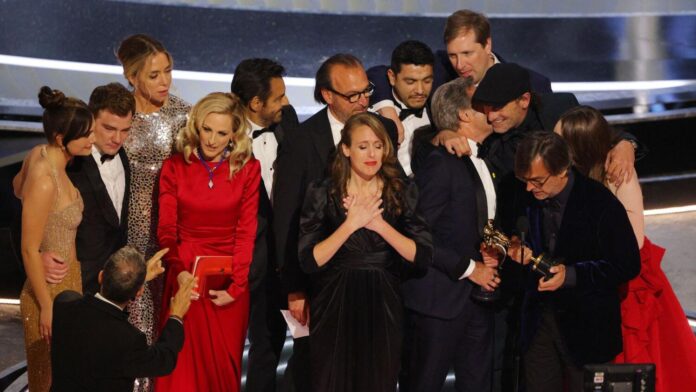Hard of hearing family show ‘CODA’ won best picture praises at the Oscars Sunday, the very first victory for a decoration, in a service that was eclipsed by best entertainer champ Will Smith striking joke artist Chris Rock in front of an audience for poking a fun at his significant other.
Tinseltown’s greatest night started with a presentation by pop megastar Beyonce, and addressed governmental issues with a snapshot of quiet over the Ukraine emergency.
However, before the last honors were distributed, the stunning Smith-Rock quarrel turned into a web sensation, and changed the temperament of the evening.
“CODA”, a vibe decent non mainstream show featuring hard of hearing entertainers in lead jobs, had been assumed a longshot for Hollywood’s greatest award until as of late, yet pulled off an amazing late flood to arise victorious.
The film packed away the memorable award for Apple TV+, an overall rookie in a streaming business sector overwhelmed by rivals like Netflix.
“Much obliged to you to the Academy for letting our ‘CODA’ leave a mark on the world this evening,” said maker Philippe Rousselet.
Taking its title from the abbreviation for offspring of hard of hearing grown-up, the film likewise won for best adjusted screenplay, and best supporting entertainer for Troy Kotsur, who plays the dad of a teen young lady who can hear and needs to seek after a profession in music.
Kotsur devoted his brilliant statuette to the hard of hearing and debilitated networks.
“This is our second,” he said.
Jessica Chastain won best entertainer for “The Eyes of Tammy Faye,” where she played a genuine TV minister who turned into an impossible hero for the LGBTQ people group.
“We’re confronted with biased and extremist regulation that is clearing our country… in conditions such as this, I consider Tammy and I’m motivated by her extreme demonstrations of adoration,” she said.
However, Hollywood’s greatest night was overwhelmed by a stunning second wherein Smith – who won best entertainer for his work on “Lord Richard” – slapped Rock in front of an audience, prior to getting back to his seat close by his better half Jada Pinkett Smith and yelling obscenities.
“Keep my significant other’s name out of your mouth,” shouted Smith, compelling the makers to bleep out a few seconds of sound from the broadcast in the United States.
Rock, introducing the best narrative award, had contrasted Jada’s firmly trimmed hair with Demi Moore’s appearance in the film “G.I. Jane.” Jada experiences alopecia, a condition causing balding.
The second left shocked watchers addressing assuming that it had been prearranged or certified.
Yet, when he got back to the stage to acknowledge his honor, a sorrowful Smith bemoaned “individuals affronting you” in Hollywood, and apologized to the Academy “and all my kindred chosen people.”
Smith, who plays the dad of tennis greats Serena and Venus Williams in “Lord Richard,” added: “Craftsmanship mirrors life. I resemble the insane dad, very much like they said about Richard Williams.”
Up to this point it had created the impression that dull, mental Western “The Power of the Dog” was destined to acquire Netflix its greatly pined for first best picture statuette.
As it ended up, the movie won just best chief for Jane Campion.
She is just the third lady to do as such in Oscars history, simply a year after Chloe Zhao turned into the second (“Nomadland”). Kathryn Bigelow was the first for “The Hurt Locker.”
Kenneth Branagh’s youth propelled “Belfast” – one more assumed best picture leader – prevailed for best unique screenplay.
Ariana DeBose won best supporting entertainer for playing Anita in “West Side Story,” and Disney’s “Encanto” was named best energized include.
DeBose, who originally made her name on Broadway, praised her noteworthy win for “a transparently eccentric lady of shading, an Afro-Latina.”
Yvett Merino, maker of Colombia-set “Encanto,” said she was “so pleased to be a piece of a film that put delightful, various characters in up front.”
“Summer of Soul” won best narrative for artist Questlove’s first film about the tremendous “Dark Woodstock” celebration that occurred in 1969 Harlem.
Japan’s “Drive My Car,” a Japanese arthouse film in light of a brief tale of a similar name by Haruki Murakami, was named best global film.
Beyonce started the broadcast with her named tune from “Lord Richard,” from the Compton courts where Serena and Venus prepared as young ladies.
Yet, the honor for best unique tune went to Billie Eilish for her James Bond signature melody “No Time to Die.”
In another melodic feature, viral sensation “We Don’t Talk About Bruno” was performed live, with Megan Thee Stallion adding an Oscars-themed refrain to the “Encanto” hit tune.
Has Wanda Sykes, Amy Schumer and Regina Hall started off procedures inside the Dolby Theater – where the Oscars returned following a year away because of the pandemic – with an initial production that made fun of everything from sexism in Hollywood to Florida’s “Don’t say gay” bill.
“This year, the Academy recruited three ladies to have on the grounds that it’s less expensive than employing one man,” said Schumer.
Sykes added: “We will have an extraordinary night this evening”




